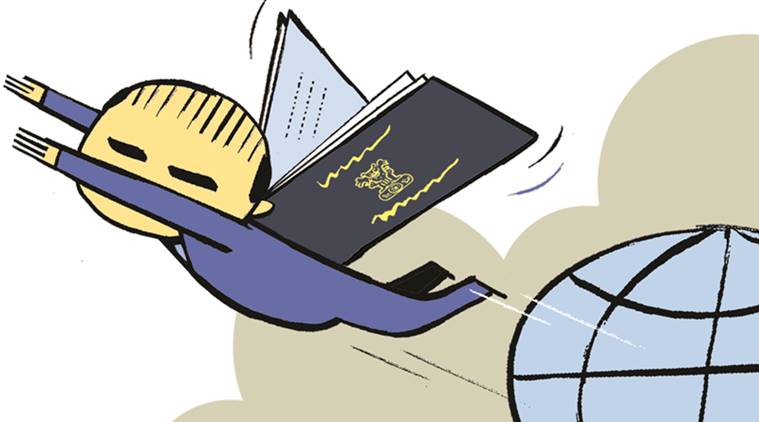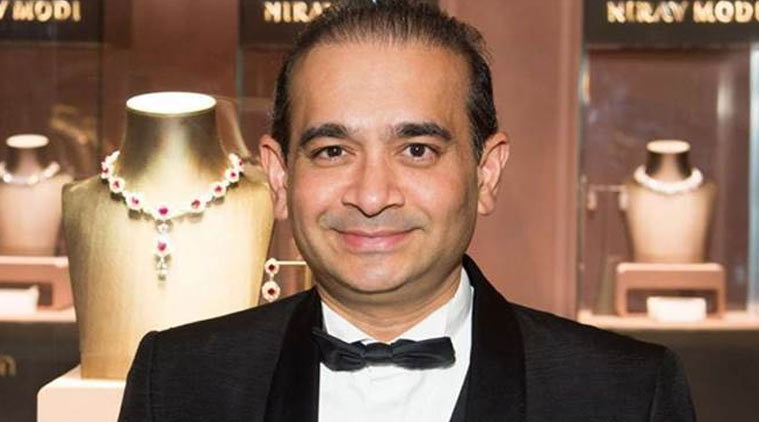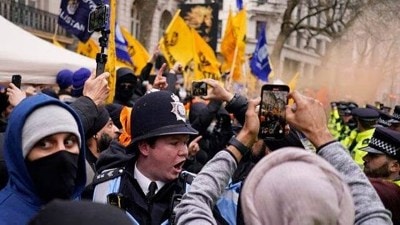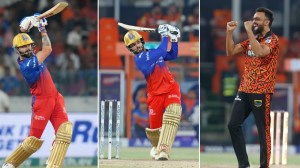- India
- International
Simply Put: How Nirav Modi continued to fly
The CBI has claimed that it wrote to the US, the UK, Belgium, France, Singapore and the UAE between April 25 and May 28 —which was after Nirav Modi had already made a few trips on his revoked passports.
 The CBI has claimed that it wrote to the US, the UK, Belgium, France, Singapore and the UAE between April 25 and May 28 —which was after Nirav Modi had already made a few trips on his revoked passports. (Illustration by C R Sasikumar)
The CBI has claimed that it wrote to the US, the UK, Belgium, France, Singapore and the UAE between April 25 and May 28 —which was after Nirav Modi had already made a few trips on his revoked passports. (Illustration by C R Sasikumar)
After India had revoked his passport, the fugitive jeweller went on using it for months to travel between countries. How was this possible, and why was an Interpol notice not enough to detect and stop him?
What kind of notice has India sought against Nirav Modi, and what has Interpol issued?
On June 11, the CBI said it had asked Interpol to issue a Red Corner Notice (RCN) against Nirav Modi, the fugitive jeweller wanted for bank fraud. On June 18, a CBI spokesperson said Interpol had issued a Diffusion Notice against Nirav Modi on February 15.
What is the difference?
A Red Corner Notice has statutory powers. It is like an arrest warrant. When Interpol issues one, all countries are duty-bound to apprehend the fugitive if s/he is in their country, or if s/he tries to leave. Getting an RCN issued involves a lengthy process, with every request vetted by the legal division of Interpol. Both the Enforcement Directorate and the CBI recently sent requests against Nirav Modi after filing chargesheets against him; Interpol has not yet issued the RCN.
A Diffusion Notice is merely a request to various countries through Interpol to keep an eye out for an alleged fugitive, and inform the requesting country of his movements. It is not legally binding, is not vetted by the Interpol legal division, and can be sent directly to various Interpol offices.

 The CBI has already filed chargesheets before a special CBI court in Mumbai in this case, which is said to be the biggest banking scam in the country, against Modi, Choksi, Nishal and Subhash Parab.
The CBI has already filed chargesheets before a special CBI court in Mumbai in this case, which is said to be the biggest banking scam in the country, against Modi, Choksi, Nishal and Subhash Parab.
When did India revoke Nirav Modi’s passport?
The Ministry of External Affairs did so on February 23, a week after having suspended the passport. On June 18, the CBI said the information about the revocation had been updated in Interpol’s central database “and was available to all countries”.
How then could he travel between countries?
In a June 5 letter, first reported by The Indian Express, Interpol informed Indian investigators that Nirav Modi had travelled on at least four dates across three countries using his revoked passport — on March 15, March 28, March 30 and March 31. He was able to do so because, sources say, there is no international common database on passports.
Only in case of an RCN, sources in Interpol and the Immigration Department say, is the information in the Interpol Central Database directly linked to the database of immigration departments of major countries. Therefore, when a fugitive passenger’s passport is swiped at the immigration counter, it automatically reflects in the system that there is an RCN pending against him.
In countries where the information is not directly linked to the immigration database, Interpol ensures that its National Central Bureaus (NCBs) in those countries make the immigration departments feed the information into their databases.
What are these NCBs?
These are nodal agencies through which Interpol operates in various countries. They are not established by Interpol, but are existing national agencies, designated to handle Interpol requests. In India, the Interpol’s NCB is the CBI, which has a division dealing with Interpol requests and is staffed with officials of the CBI itself.
If the information is linked to the database only when Interpol issues an RCN, does it mean that a fugitive facing a Diffusion Notice can clear immigration?
For such notices, the Interpol data are not directly linked to the immigration database. So, unless the NCB of each country ensures an update of such data in the immigration database, it will not reflect automatically when a passport is swiped at the immigration counter. The same is the case with information on revocation of a passport. That is why the CBI, after feeding such data in the Interpol Central Database, was also writing constantly to six different countries to ensure that they kept an eye out for Nirav Modi’s movements.
 After India had revoked his passport, the fugitive jeweller went on using it for months to travel between countries. (Representational)
After India had revoked his passport, the fugitive jeweller went on using it for months to travel between countries. (Representational)
What are these six countries, and how have they responded?
The CBI has claimed that it wrote to the US, the UK, Belgium, France, Singapore and the UAE between April 25 and May 28 —which was after Nirav Modi had already made a few trips on his revoked passports. Responses depend on diplomatic relations, and few countries generally bother to act on Diffusion Notices. Only the UK has responded to India’s Diffusion Notice — with delayed information about Nirav Modi’s travels two months earlier. Since nothing except an RCN is legally binding, agencies send reminders on pending notices. There is no statutory stipulation or laid-down procedure for this.
If a fugitive does not adhere to a set movement pattern, there is little an investigation agency can do. Nirav Modi, last seen in Davos in end-January, has crossed border posts, where immigration authorities have failed to stop him. Governments ultimately depend on cooperation between intelligence agencies for tracking the movement of fugitives.
Nirav Modi allegedly had six different passports. How is this possible, and which one of these has India revoked?
Only the latest passport will be valid. When a frequent flier’s passport booklet runs out of pages, or when a passport-holder has changes made in name, address etc, he or she has to get a new passport. The moment a new one is issued, the previous one is cancelled.
How does Interpol work, and what is its record in delivering to Indian agencies the fugitives they want?
Short for International Criminal Police Organisation, Interpol was established in 1923 and has 192 member countries, with a General Secretariat in Lyon (France), a Global Complex for Innovation in Singapore, seven regional bureaus, and Special Representative offices in the African Union, the European Union and the United Nations, to ensure cooperation among police agencies working in different legal environments to combat crimes of an international nature. Because Interpol has to deal with a number of barriers — such as differing legal systems, definitions of crimes, rules for evidence, incompatible extradition laws, restrictions on sharing information — its success depends largely on cooperation between one country and another, and diplomatic relations have a significant role in this.
There are over 650 RCNs pending against criminals wanted by India. These include Indian fugitives Dawood Ibrahim and members of his gang who have been holed up in Pakistan since 1993, and Pakistan nationals Hafiz Saeed and Zaki-ur-Rehman Lakhvi, who are wanted for the 26/11 attacks. India’s Chhota Rajan, despite an RCN having been issued against him, managed to keep moving from one country to another on fake passports, until he was finally arrested.
What options does the CBI have now?
There is nothing the CBI can do on its own when a fugitive is out of its legal jurisdiction. It can hope that Interpol will issue an RCN and that Nirav Modi will be located and detained in whichever country he is found. India will then have to send an extradition request and fight a court battle in that country to get him back. It can also use its diplomatic leverage for extradition, provided it builds a convincing case against him.
More Explained
EXPRESS OPINION
Apr 26: Latest News
- 01
- 02
- 03
- 04
- 05










































